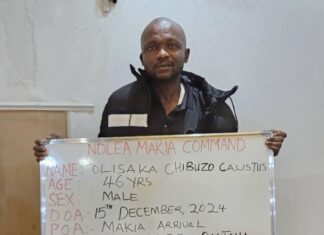Odi, Zaki Biam and Okuoma are metaphors of what Nigeria has turned to – a killing field. The recurrent flow of blood in the land is giving us a bizarre definition of a people with scant regards for human life.
By Emeka Alex Duru
There is, perhaps, no other incident in recent time that has evoked sorrow and emotions among Nigerians as the killing of soldiers by warring youths of Okuoma community of Delta state. Initial reports put the number at 16 but their picture collage indicated that they were 17. The gravity of the loss has in a way, overtaken the anger in the land over the allegations of padding the 2024 budget by the national assembly and mindless appropriation of the commonweal by senators.
Events surrounding the death of the soldiers are quite greasy. They meet the maxim in the media that when it bleeds, it leads. By that principle, the loss of a single soul, overshadows every other news item – a recognition of the sanctity of human life. The empathy for the fallen soldiers by Nigerians, therefore, finds resonance.
Reports on their death, were gruesome. A statement by the Acting Director of Defence Information, Brigadier General Tukur Gusau, said the deceased soldiers included the Commanding Officer, two Majors, one Captain and other soldiers. They were said to be on peacekeeping mission in the community following a clash with another community when they were surrounded by Okuoma youths and were killed. That is pathetic and condemnable.
Since the incident, soldiers have reportedly been on rampage, setting houses ablaze in Okuoma and making some arrests, in retaliation. Some members of the community have allegedly by killed by the irate military personnel.
The nearest the nation came to this sorry point was during the administration of President Olusegun Obasanjo in Odi, Bayelsa State and Zaki Biam Benue State.
The Odi mayhem was an attack by the armed forces on November 20, 1999, against the predominantly Ijaw town of Odi in Bayelsa State, at the heat of the conflict in the Niger Delta over indigenous rights to oil resources and environmental protection.
READ ALSO:
17 soldiers killed in Okuama will be confered with National Honours – Tinubu
The invasion was triggered by the murder of 12 personnel of the Nigerian Police by a suspected criminal gang near Odi. In revenge, the military moved against the village but ran into an ambush resulting to exchange of fire with armed gangs accused of using the civilian population as cover. Subsequent developments led to the attack on the civilian population and buildings in the town. In a fit of rage by soldiers, every structure in the town except the bank, the Anglican church and the health centre was brought down and set ablaze. It was estimated that over 900 civilians were killed in the offensive.
The Zaki-Biam incident was a mass execution of hundreds of unarmed Tiv civilians by the Nigerian Army between 20 and 24 October 2001. The exercise was a surreptitious operation by the army in retaliation to the killing of 19 soldiers, whose mutilated bodies were found on 12 October 2001, near some Tiv villages in Benue State. The massacre took place in villages including Gbeji, Vaase, Anyiin, Iorja, Ugba, Tse-Adoor, Sankera, Kyado and Zaki-Biam. One-time Chief of Army Staff, late General Silvanus Victor Malu, lost an uncle and other relations in the crisis.
As in Odi and Zaki Biam, blood is currently flowing in Okuoma, with reports of many residents killed and others displaced. From whatever angle it is looked at, the Okuoma episode is a national calamity. A country that is not at war has no reasons to lose such quantum of human resources in uniform and civilian population. There is no how the discussion on Okuoma can be concluded without blaming the odious development on our inability as a nation to draw salient lessons from the unfortunate episodes in Odi and Zaki Biam.
As it is always the case when such unusual occurrences take place, many in high offices are releasing statements condemning the killing of the soldiers and demanding appropriate punishment for the brains behind the barbaric act. President Bola Tinubu and Delta State governor, Sheriff Oborevwori have vowed that the perpetrators will not go unpunished. “The cowardly offenders responsible for this heinous crime will not go unpunished”, Tinubu threatened in a statement by his media office.
The senate holds similar position, in addition to recommending compensation to the families of the slain military men. The request was made during a session last Tuesday, as the senators observed a minute silence in honour of the fallen soldiers. A directive was also given to the senate committees on army, navy and defence, to liaise with the Nigerian Army to investigate the matter. That seems the way to go.
In the past, such expressions of empathy, sabre-rattling and high-sounding orations, had easily died down after the events and as they say, life continued. With that, no lessons were learned, no punishment meted to the brains behind the sordid act. Those that bore the brunt, were usually the old, the invalid and ordinary Nigerians that lacked contacts that mattered.
Okuoma should not be allowed to fall into that arrangement. No efforts should be spared in ensuring that those responsible for the heinous crime in the community are fished out and made to face the full consequences of their actions through a fair and transparent legal process. Military men who may also have acted beyond their brief by committing arson, setting houses ablaze and killing, perhaps, innocent members of the Okuoma community, must be brought to book.
The international conventions on military-civilian relations which Nigeria subscribes to, must be fully adhered to, here. It will be difficult to assume that the cowards that carried out the Okuoma killings would still be in their various homes in the community. But it is only a thorough investigation that can established what must have happened and the roles played by the individual members involved.
Odi, Zaki Biam and Okuoma are metaphors of what Nigeria has turned to – a killing field. The recurrent flow of blood in the land is giving us a bizarre definition of a people with scant regards for human life. We are painfully but gradually sliding to a standard where faceless goons wiping out settlements, criminals lording it over the people or security agents turning their weapons against those that they are paid to protect, does no longer attract headlines. The Okuoma incident should mark a defining moment to halt impunities in the land and for the country to take a stand and proclaim; thus far, no further.
In sociology of crime, the first account to hit the streets, may not necessarily be the true version of what may have taken place. It is only a thorough and unbiased investigation that can explain what truly happened in Okuoma.
No stone should be left unturned in getting to the roots of the soldiers’ death. Even in death, they deserve justice. The members of the Okuoma community also deserve the justice of stating their case. The society deserves the justice of knowing what actually happened to all the parties in the conflict.
It is only by dispensing justice to all, that the souls of the departed can rest in peace and lasting peace entrenched in the system. Any panicky measures that pervert justice in the current incident, can only postpone further trouble in Okuoma or any other part of the country.













